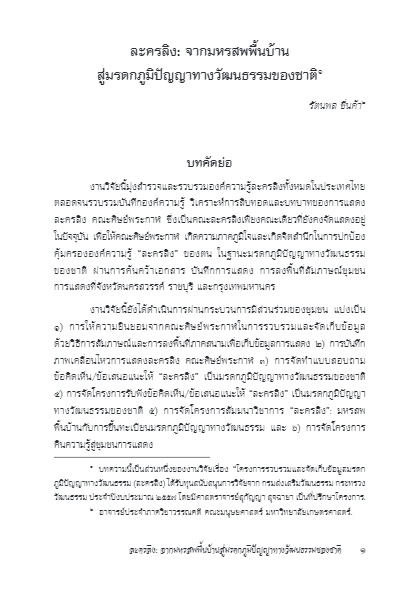รัตนพล ชื่นค้า
บทคัดย่อ
งานวิจัยนี้มุ่งสำรวจและรวบรวมองค์ความรู้ละครลิงทั้งหมดในประเทศไทย ตลอดจนรวบรวมบันทึกองค์ความรู้ วิเคราะห์การสืบทอดและบทบาทของการแสดงละครลิง คณะศิษย์พระกาฬ ซึ่งเป็นคณะละครลิงเพียงคณะเดียวที่ยังคงจัดแสดงอยู่ในปัจจุบัน เพื่อให้คณะศิษย์พระกาฬ เกิดความภาคภูมิใจและเกิดจิตสำนึกในการปกป้องคุ้มครององค์ความรู้ “ละครลิง” ของตน ในฐานะมรดกภูมิปัญญาทางวัฒนธรรมของชาติ ผ่านการค้นคว้าเอกสาร บันทึกการแสดง การลงพื้นที่สัมภาษณ์ชุมชนการแสดงที่จังหวัดนครสวรรค์ ราชบุรี และกรุงเทพมหานคร
งานวิจัยนี้ยังได้ดำเนินการผ่านกระบวนการมีส่วนร่วมของชุมชน แบ่งเป็น 1) การให้ความยินยอมจากคณะศิษย์พระกาฬในการรวบรวมและจัดเก็บข้อมูลด้วยวิธีการสัมภาษณ์และการลงพื้นที่ภาคสนามเพื่อเก็บข้อมูลการแสดง 2) การบันทึกภาพเคลื่อนไหวการแสดงละครลิง คณะศิษย์พระกาฬ 3) การจัดทำแบบสอบถามข้อคิดเห็น/ข้อเสนอแนะให้ “ละครลิง” เป็นมรดกภูมิปัญญาทางวัฒนธรรมของชาติ 4) การจัดโครงการรับฟังข้อคิดเห็น/ข้อเสนอแนะให้ “ละครลิง” เป็นมรดกภูมิปัญญาทางวัฒนธรรมของชาติ 5) การจัดโครงการสัมมนาวิชาการ “ละครลิง”: มหรสพพื้นบ้านกับการขึ้นทะเบียนมรดกภูมิปัญญาทางวัฒนธรรม และ 6) การจัดโครงการคืนความรู้สู่ชุมชนการแสดง
ผลการศึกษาพบว่า องค์ความรู้ละครลิงในประเทศไทยประกอบด้วยองค์ความรู้ของละครลิงคณะวัฒนาวานร คณะลิงไทยมั่นคง คณะดำรงศิลปวานร และคณะศิษย์พระกาฬ ปัจจุบันเหลือละครลิงคณะศิษย์พระกาฬเพียงคณะเดียวที่ยังคงจัดแสดงอยู่ และมีการสืบทอด องค์ความรู้ให้แก่สมาชิกในสายตระกูล โดยผู้ที่มีองค์ความรู้ละครลิงมากที่สุด คือนายปัญญา กันรอบรู้ และผู้สืบทอดองค์ความรู้ละครลิง ได้แก่ นายวัชระ กันรอบรู้ นางวัชรี กันรอบรู้ และนายประกิจ กันรอบรู้
สภาพปัจจุบันของการแสดงละครลิง คณะศิษย์พระกาฬได้รับความนิยมน้อยลงเมื่อเทียบกับอดีต แต่ยังคงมีบทบาทในด้านการให้ความบันเทิงและด้านพิธีกรรมการแก้บน ผลการวิจัยยังพบว่าปัจจัยที่ส่งผลคุกคามองค์ความรู้ละครลิงในปัจจุบันมี 3 ปัจจัย ได้แก่ ปัจจัยด้านผู้ถ่ายทอด ด้านผู้สืบทอด และด้านสภาพการแสดง
(ตีพิมพ์ใน วารสารไทยศึกษา ปีที่ 11 ฉบับที่ 2 (กรกฎาคม – ธันวาคม 2558) หน้า 1-33)
Monkey Show: From Folk Performance To National Intangible Cultural Heritage
Rattanaphon Chuenka
Abstract
This research aims to collect all available knowledge about the Monkey Show in Thailand, as well as analyze the role and sustainability of this art as part of Thailand’s Intangible Cultural Heritage. The work focuses on the troupe “Sisphrakarn”, the only existing Monkey Show troupe, in order to collect all available knowledge and help create a sense of pride and ownership among the people of Thailand and boost moral support to the troupe who plays an important role in supporting and sustaining the knowledge of the Monkey Show act. This study analyaes and traces the background and literary reviews of the history of Monkey act Show in the areas where this show has been active, such as in Nakornsawan, Rachaburi, and Bangkok.
This research is conducted through community participation: by 1) obtaining permission from the owner of the show to gather information and conduct public intervies, 2) receiving permission to film the show, and 3) collecting social opinions through the use of public questionnaires to entitle the show as Thailand’s Intangible Cultural Heritage. Moreover, during this project we have had the opportunity to organize a public hearing on the subject of “Monkey Show as Thailand’s Intangible Cultural Heritage” and a seminar, “Monkey Show: Folk performance and its submission as Thailand’s Intangible Cultural Heritage.” Lastly, the project also gives “Sisphrakarn” the opportunity to review and reestablish their knowledge about the performance by giving full support to the researcher.
The research has found there have been the different troupes of Monkey Shows in Thailand: Wattana Vanorn Troupe, Thaimankong Troupe, Damrong Silpa Vanorn Troupe and Sisphrakarn Troupe. However only is still Sisphrakarn running their show and passing knowledge among family members such as, Mr.Panya Kanrobru, and his heir and successors, Mr.Vatchara Kanrobru, Ms.Vatcharee Kanrobru and Mr.Prakit Kanrobru.
The current situation of the Monkey Show is in crisis. Sisphrakarn Troupe’s popularity has been significantly lessened compared to that of the past. The role of Monkey Show today presented themselves as 1) a form of entertainment and 2) as a present to fulfill one’s vow to the gods. The research has found that there are 3 factors to threaten with knowledge of Monkey Show: transmitter, successor and state of showing.
(Published in Journal of Thai Studies Volume 11 Number 2 (July – December 2015) Page 1-33)
บทความ / Full Text : Download
